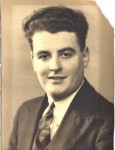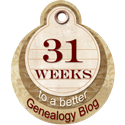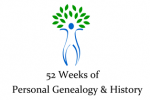 The will made by an ailing and aging yeoman Mathew DENCHFIELD is transcribed here and helps to shed light on the structure of his family in the early part of 17th Century North Marston. It was written in his 56th year, when his health was declining and he was no doubt contemplating his own mortality. The fact that it was nun cupative, or giving orally, would seem to indicate that his health was so poor he was unable to write.
The will made by an ailing and aging yeoman Mathew DENCHFIELD is transcribed here and helps to shed light on the structure of his family in the early part of 17th Century North Marston. It was written in his 56th year, when his health was declining and he was no doubt contemplating his own mortality. The fact that it was nun cupative, or giving orally, would seem to indicate that his health was so poor he was unable to write.
Mathew was the son of Richard DENCHFIELD and Margaret INGRAM, who were married in North Marston on 7 March 1601. As his baptism took place at St. Mary’s Church on 7 March 1601, just nine months after the wedding, it’s reasonable to say that Mathew was their firstborn child. No other Denchfield baptisms in the parish register are attributed to this couple, however as there were many gaps in the registers in the early 1600s, it’s quite possible several more children were born to them over the next decade or so. Unfortunately this Richard DENCHFIELD does not appear to have made a will.
Mathew was 30 years old when he married his first wife Joan STREAM, and only 31 when he buried her and married his second wife Mary SPENCER a few months later on 25 January 1633.
Mathew and Mary’s Children
The baptisms of the four children mentioned in Matthew’s will can all be found in the St Mary register: Prudence (10 November 1633), Richard (13 February 1637), John (30 November 1639), and Matthew (3 November 1641). Following this were the civil war years, and a span of several years during which the Commonwealth, somewhat haphazardly, took over the tracking of all civil records. Very few records from this period exist today.
Prudence, Matthew and Mary’s only daughter (or rather the only one known to have survived childhood), whose marriage to Henry STANBRIDGE took place some time toward the end of the Commonwealth gap years, had at least four children with him (Richard, born before 1658 as he is mentioned in his grandfather’s will, Mary, Henry, John, and possibly other children born in the mid 1660s and early 1670s) before her death in 1680, although neither Mary nor Henry Jr lived to the age of two. The ‘ewe and lamb‘ left to his grandson Richard STANBRIDGE was a bequest traditionally made to all living grandsons and granddaughters, suggesting none of Matthew’s other children had produced heirs by 1658.
Richard, Mathew’s firstborn son, was the natural heir of any land which Mathew owned at the time of his death. (Land was not typically disposable by wills, which is why the bequests typically deal only with money and personal items.) Not much is known about this Richard, as he does not appear to have written a will of his own. He may have married a woman named Elizabeth as there was a burial in 1700 of ‘Elizabeth, wife of Richard, husbandman‘ although there is no other evidence in the St Mary’s registers to suggest this link is anything more than conjectural. Even a cursory glance through the parish records reveals this family’s penchant for naming sons John, Richard, and occasionally Matthew, so there could have been any number of Richard Denchfields in and about North Marston around that same time period and it’s quite possible this Elizabeth was married to one of Richard’s cousins. At any rate, being the oldest son would likely have meant that our Richard, following in his father’s footsteps, was a yeoman, husbandman farmer, regardless of who he married.
Son John, of whom my family is descended, is described in Mathew’s will as an apprentice. It appears from John’s own will, written 20 years later, that he was an iremonger, which meant he made or sold metal gadgets and tools for domestic use. Originally the term was used to mean brass or tin artisan, so the apprenticeship Mathew mentioned was likely where John learned the craft of tool making. He would have been 19 years old when Mathew wrote his will.
Mathew’s youngest son, and namesake, married a woman named Elizabeth and moved to nearby Wing where they had a large family with many children who have carried on the Denchfield name in that village.
Mathew’s Wife Mary
In the 1600s, women did not own property and they were not the natural heirs of their husband’s estate. The heir was traditionally the oldest son, which is why many early wills don’t reference the firstborn son as he stood to inherit his father’s land and real property by virtue of law.
In Mathew’s case, he specifically names his wife Mary as having rights to ‘halfe my house & land w[i]th halfe the Appurtenances to the sayd house & land…‘for the ‘full terme of her naturall life.‘ The other half of the house and land would have gone directly to Richard. How long Mary lived in the house following her husband’s death isn’t clear. She served as executor at the probate of Matthew’s will on 7 January 1660/1, however no burial record has been found for her to date. I haven’t had any luck finding a baptismal record for Mary either, suggesting she may not have been born in North Marston. If that’s the case, the family may have chosen to bury her in her childhood parish, which might explain why there’s no record of her in the St. Mary’s burial register.


















Very interesting that he bestows half of his house and land on his wife Mary. As it was far from the norm for the times there surely is a story there!
It shows such a respect for her as an individual, and perhaps as well a concern for her welfare after his passing that makes him a very interesting and likeable man from the vantage point of our times.
Beautifully written, Claire!
The Denchfield men seem to have been a thoughtful bunch… I’m working on Mathew’s grandson’s will and he leaves property to his wife as well. She is also named as sole executrix, even though several of his brothers were living in the same village. I wonder how common that was.